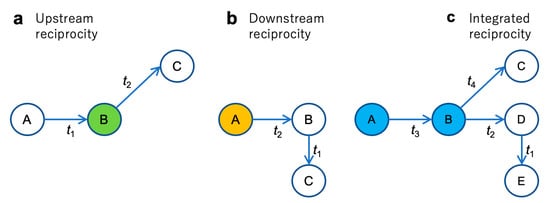Journal Description
Games
Games
is a scholarly, peer-reviewed, open access journal of studies on game theory and its applications published bimonthly online by MDPI.
- Open Access— free for readers, with article processing charges (APC) paid by authors or their institutions.
- High Visibility: indexed within Scopus, ESCI (Web of Science), MathSciNet, zbMATH, RePEc, EconLit, EconBiz, and other databases.
- Rapid Publication: manuscripts are peer-reviewed and a first decision is provided to authors approximately 17.1 days after submission; acceptance to publication is undertaken in 3.9 days (median values for papers published in this journal in the second half of 2023).
- Recognition of Reviewers: reviewers who provide timely, thorough peer-review reports receive vouchers entitling them to a discount on the APC of their next publication in any MDPI journal, in appreciation of the work done.
Impact Factor:
0.9 (2022)
Latest Articles
The Evolution of Cooperation and Diversity under Integrated Indirect Reciprocity
Games 2024, 15(2), 15; https://doi.org/10.3390/g15020015 - 18 Apr 2024
Abstract
Indirect reciprocity is one of the major mechanisms driving the evolution of cooperation in human societies. There are two types of indirect reciprocity: upstream and downstream reciprocity. Cooperation in downstream reciprocity follows the pattern ‘You helped someone, and I will help you’, while
[...] Read more.
Indirect reciprocity is one of the major mechanisms driving the evolution of cooperation in human societies. There are two types of indirect reciprocity: upstream and downstream reciprocity. Cooperation in downstream reciprocity follows the pattern ‘You helped someone, and I will help you’, while the direction of cooperation is reversed in upstream reciprocity, which follows the pattern ‘You helped me, and I will help someone else’. These two types of indirect reciprocity often occur in combination. However, upstream and downstream reciprocity have mostly been theoretically studied in isolation. In this study, we propose a new model that integrates both types of reciprocity. In particular, we apply the standard giving-game framework of indirect reciprocity and analyze the three-strategy model including reciprocal altruists, indiscriminate altruists, and free riders using evolutionary game theory. We show that the model allows reciprocal altruists and free riders to coexist stably in well-mixed populations. We also find that by accounting for inattention in the assessment rule, the stability of this mixed equilibrium can be strengthened to prevent the invasion of infamous indiscriminate altruists and can even be made globally stable.
Full article
(This article belongs to the Section Cooperative Game Theory and Bargaining)
►
Show Figures
Open AccessArticle
Quid Pro Quo Diplomacy
by
Matt Malis and Alastair Smith
Games 2024, 15(2), 14; https://doi.org/10.3390/g15020014 - 17 Apr 2024
Abstract
►▼
Show Figures
Political leaders value public demonstrations of support from foreign leaders and frequently make concessions in order to obtain them. We model the bargaining dynamics surrounding these exchanges and their impact on the recipient leader’s political survival, with a focus on top-level diplomatic visits
[...] Read more.
Political leaders value public demonstrations of support from foreign leaders and frequently make concessions in order to obtain them. We model the bargaining dynamics surrounding these exchanges and their impact on the recipient leader’s political survival, with a focus on top-level diplomatic visits as a means of signaling international support. Our model addresses two interrelated questions; first, we consider how symbolic displays of support from one leader to another can be informative even when they are “purchased” with concessions, and second, we derive the equilibrium price and political impact of a visit under different bargaining protocols. The incentive to make a concession in exchange for a visit generally undermines a visit’s signaling value. We identify a diplomatic resource curse, where the existence of opportunities for diplomatic exchange can force leaders into accepting visit-for-concession deals that leave them worse off than if they were diplomatically isolated. Visits never occur when negotiations are fully transparent. Mutually beneficial quid pro quo diplomacy requires opacity in negotiations.
Full article
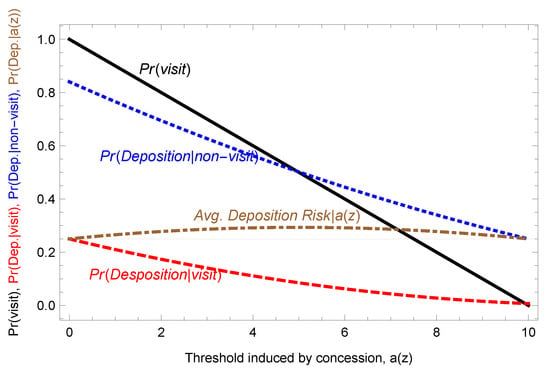
Figure 1
Open AccessArticle
Dynamic Awareness and Strategic Adaptation in Cybersecurity: A Game-Theory Approach
by
Katarina Kostelić
Games 2024, 15(2), 13; https://doi.org/10.3390/g15020013 - 08 Apr 2024
Abstract
Awareness and human factors are becoming ever more important in cybersecurity, particularly in the context of small companies that may need more resources to deal with cybersecurity effectively. This paper introduces a theoretical framework for game analysis of the role of awareness in
[...] Read more.
Awareness and human factors are becoming ever more important in cybersecurity, particularly in the context of small companies that may need more resources to deal with cybersecurity effectively. This paper introduces a theoretical framework for game analysis of the role of awareness in strategic interactions between the manager and a hacker. A computable approach is proposed based on Bayesian updating to model awareness in a cybersecurity context. The process of gaining awareness considers the manager’s perception of the properties of the hacker’s actions, game history, and common knowledge. The role of awareness in strategy choices and outcomes is analyzed and simulated, providing insights into decision-making processes for managers and highlighting the need to consider probabilistic assessments of threats and the effectiveness of countermeasures. The accuracy of the initial frequencies plays a significant role in the manager’s success, with aligned frequencies leading to optimal results. Inaccurate information on prior frequencies still outperforms complete uncertainty, emphasizing the value of any available intelligence. However, the results suggest that other awareness modeling approaches are necessary to enhance the manager’s agility and adaptiveness when the prior frequencies do not reflect the immediate attacker’s type, indicating the need for improved intelligence about cyber-attacks and examinations of different awareness modeling approaches.
Full article
(This article belongs to the Special Issue Game Theory for Cybersecurity and Privacy)
►▼
Show Figures
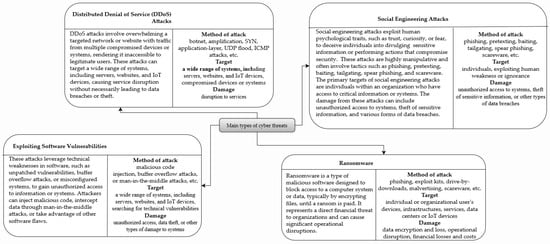
Figure 1
Open AccessArticle
Physics-Informed Graph Neural Operator for Mean Field Games on Graph: A Scalable Learning Approach
by
Xu Chen, Shuo Liu and Xuan Di
Games 2024, 15(2), 12; https://doi.org/10.3390/g15020012 - 30 Mar 2024
Abstract
►▼
Show Figures
Mean-field games (MFGs) are developed to model the decision-making processes of a large number of interacting agents in multi-agent systems. This paper studies mean-field games on graphs (
Mean-field games (MFGs) are developed to model the decision-making processes of a large number of interacting agents in multi-agent systems. This paper studies mean-field games on graphs (
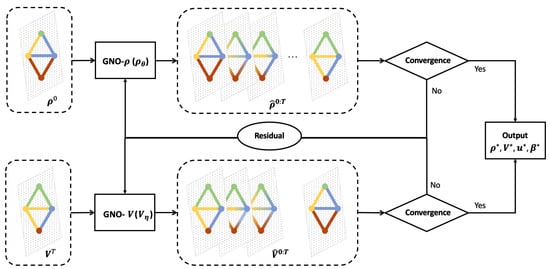
Figure 1
Open AccessArticle
Matching with Nonexclusive Contracts
by
Daniel Ripperger-Suhler
Games 2024, 15(2), 11; https://doi.org/10.3390/g15020011 - 30 Mar 2024
Abstract
A variety of empirical papers document the coexistence of exclusive and nonexclusive contracts within a given market across a multitude of industries. However, the theoretical literature has not been able to generate a differentiable model with the coexistence of these contracts. I rectify
[...] Read more.
A variety of empirical papers document the coexistence of exclusive and nonexclusive contracts within a given market across a multitude of industries. However, the theoretical literature has not been able to generate a differentiable model with the coexistence of these contracts. I rectify the gap in the literature by developing a theoretical model of two-sided matching, in which principals and agents choose between exclusive and nonexclusive contracts with cost-of-effort inefficiencies. I find that the coexistence of contracts relies on cost-sharing between principals, relative bargaining power, and an endogenous outside option. I also find that the pattern of contracts is monotonic with respect to the type distributions of principals and agents.
Full article
(This article belongs to the Special Issue Industrial Organization and Organizational Economics)
►▼
Show Figures

Figure 1
Open AccessArticle
Random Informative Advertising with Vertically Differentiated Products
by
Rim Lahmandi-Ayed and Didier Laussel
Games 2024, 15(2), 10; https://doi.org/10.3390/g15020010 - 22 Mar 2024
Abstract
We study a simple model in which two vertically differentiated firms compete in prices and mass advertising on an initially uninformed market. Consumers differ in their preference for quality. There is an upper bound on prices since consumers cannot spend more on the
[...] Read more.
We study a simple model in which two vertically differentiated firms compete in prices and mass advertising on an initially uninformed market. Consumers differ in their preference for quality. There is an upper bound on prices since consumers cannot spend more on the good than a fixed amount (say, their income). Depending on this income and on the ratio between the advertising cost and quality differential (relative advertising cost), either there is no equilibrium in pure strategies or there exists one of the following three types: (1) an interior equilibrium, where both firms have positive natural markets and charge prices lower than the consumer’s income; (2) a constrained interior equilibrium, where both firms have positive natural markets, and the high-quality firm charges the consumer’s income or (3) a corner equilibrium, where the low-quality firm has no natural market selling only to uninformed customers. We show that no corner equilibrium exists in which the high-quality firm would have a null natural market. At an equilibrium (whenever there exists one), the high-quality firm always advertises more, charges a higher price and makes a higher profit than the low-quality one. As the relative advertising cost goes to infinity, prices become equal and the advertising intensities converge to zero as well as the profits. Finally, the advertising intensities are, at least globally, increasing with the quality differential. Finally, in all cases, as the advertising parameter cost increases unboundedly, both prices converge increasingly towards the consumer’s income.
Full article
(This article belongs to the Special Issue Game Theory in Economics: Recent Advances in Spatial Competition)
►▼
Show Figures
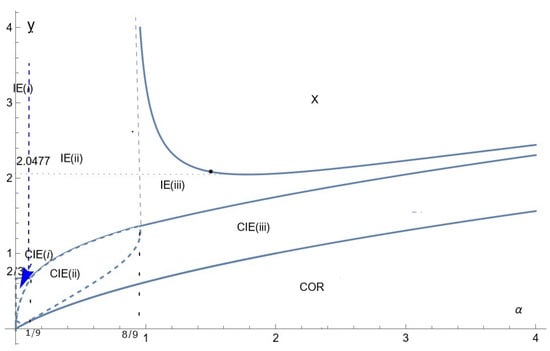
Figure 1
Open AccessArticle
Dynamic Vertical Foreclosure with Learning-by-Doing Production Technologies
by
Frago Kourandi and Nikolaos Vettas
Games 2024, 15(2), 9; https://doi.org/10.3390/g15020009 - 29 Feb 2024
Abstract
Here, we study vertical foreclosure in a dynamic setup with learning-by-doing production technologies. There is a downstream monopoly and an upstream duopoly, where manufacturers produce differentiated products and can gain proficiency through the accumulation of their production. We study the dynamic interactions in
[...] Read more.
Here, we study vertical foreclosure in a dynamic setup with learning-by-doing production technologies. There is a downstream monopoly and an upstream duopoly, where manufacturers produce differentiated products and can gain proficiency through the accumulation of their production. We study the dynamic interactions in the vertical chain when the monopolist sets the prices; we find that customer foreclosure may arise in equilibrium when the products are close substitutes and be welfare-enhancing. The rate of learning is lower than the social optimal and a social planner would tend to impose exclusivity more often compared to the downstream monopolist.
Full article
(This article belongs to the Special Issue Industrial Organization and Organizational Economics)
►▼
Show Figures
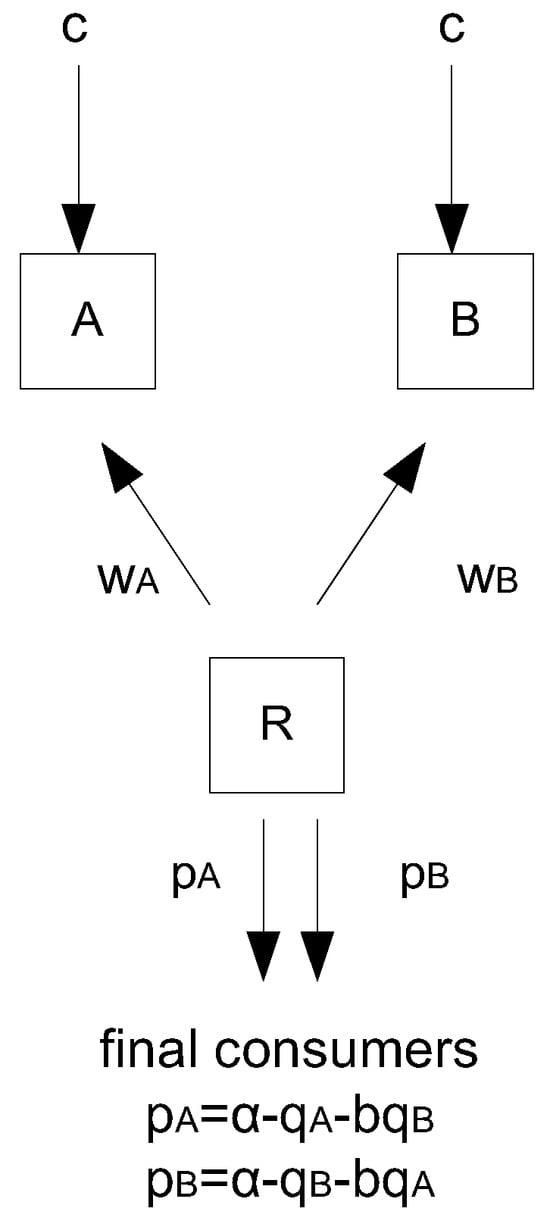
Figure 1
Open AccessArticle
Imitation Dynamics in Oligopoly Games with Heterogeneous Players
by
Daan Lindeman and Marius I. Ochea
Games 2024, 15(2), 8; https://doi.org/10.3390/g15020008 - 28 Feb 2024
Abstract
We investigate the role and performance of imitative behavior in a class of quantity-setting, Cournot games. Within a framework of evolutionary competition between rational, myopic best-response and imitation heuristics with differential heuristics’ costs, we found that the equilibrium stability depends on the sign
[...] Read more.
We investigate the role and performance of imitative behavior in a class of quantity-setting, Cournot games. Within a framework of evolutionary competition between rational, myopic best-response and imitation heuristics with differential heuristics’ costs, we found that the equilibrium stability depends on the sign of the cost differential between the unstable heuristic (Cournot best-response) and the stable one (imitation) and on the intensity of the evolutionary pressure. When this cost differential is positive (i.e., imitation is relatively cheaper vis a vis Cournot), most firms use this heuristic and the Cournot equilibrium is stabilized for market sizes for which it was unstable under Cournot homogeneous learning. However, as the number of firms increases
(This article belongs to the Section Learning and Evolution in Games)
►▼
Show Figures
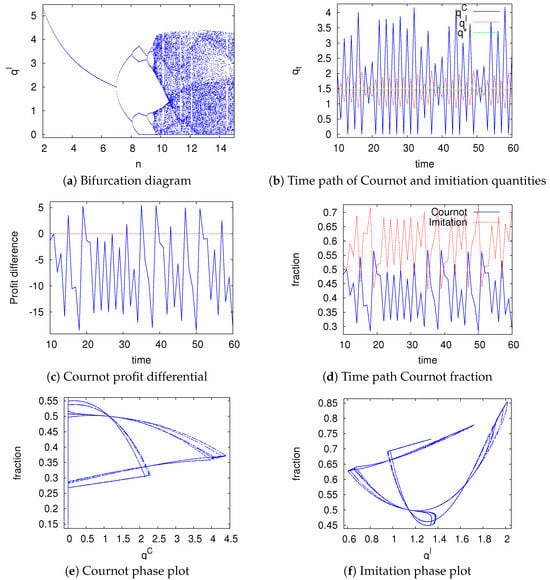
Figure 1
Open AccessArticle
Nash Equilibria in Two-Resource Congestion Games with Player-Specific Payoff Functions
by
Fatima Khanchouche, Samir Sbabou, Hatem Smaoui and Abderrahmane Ziad
Games 2024, 15(2), 7; https://doi.org/10.3390/g15020007 - 26 Feb 2024
Abstract
►▼
Show Figures
In this paper, we examine the class of congestion games with player-specific payoff functions introduced by Milchtaich, I. (1996). Focusing on the special case of two resources, we give a short and simple method for identifying all Nash equilibria in pure strategies. We
[...] Read more.
In this paper, we examine the class of congestion games with player-specific payoff functions introduced by Milchtaich, I. (1996). Focusing on the special case of two resources, we give a short and simple method for identifying all Nash equilibria in pure strategies. We also provide a computation algorithm based on our theoretical analysis.
Full article
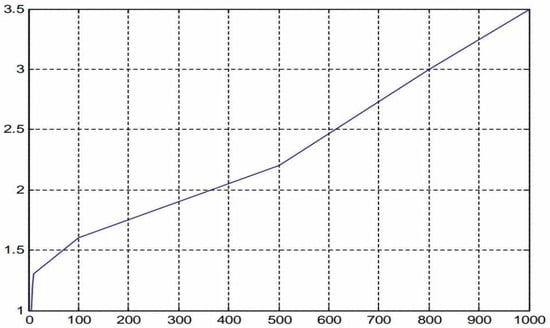
Figure 1
Open AccessArticle
A Model of Competing Gangs in Networks
by
Alexis Poindron and Nizar Allouch
Games 2024, 15(2), 6; https://doi.org/10.3390/g15020006 - 21 Feb 2024
Abstract
Two groups produce a network good perceived by a third party, such as a police or military institution, as a ‘public bad’, referred to as ‘crime’ for simplicity. These two groups, considered mafias, are assumed to be antagonists, whether they are enemies or
[...] Read more.
Two groups produce a network good perceived by a third party, such as a police or military institution, as a ‘public bad’, referred to as ‘crime’ for simplicity. These two groups, considered mafias, are assumed to be antagonists, whether they are enemies or competitors in the same market, causing harm to each other’s activities. This paper provides guidelines for the policymaker, typically the police, seeking to minimize overall crime levels by internalizing these negative externalities. One specific question is investigated: the allocation of resources for the police. In general, we recommend a balanced crackdown on both antagonists, but an imbalance in group sizes may lead the police to focus on the more criminal group.
Full article
(This article belongs to the Section Applied Game Theory)
►▼
Show Figures
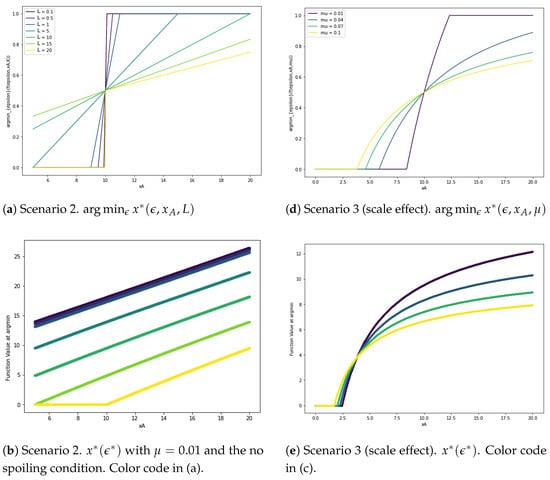
Figure 1
Open AccessEditorial
Game Theory Applications to Socio-Environmental Studies, Development Economics, and Sustainability Research
by
Elkhan Richard Sadik-Zada, Andrea Gatto, Luigi Aldieri, Giovanna Bimonte, Luigi Senatore and Concetto Paolo Vinci
Games 2024, 15(1), 5; https://doi.org/10.3390/g15010005 - 31 Jan 2024
Abstract
The present investigation elaborates on the level of game theory application for the applied and theoretical analyses of climate change and development studies. This editorial shows that the common good character of global climate alongside the increasing internalization of environmental externalities through national
[...] Read more.
The present investigation elaborates on the level of game theory application for the applied and theoretical analyses of climate change and development studies. This editorial shows that the common good character of global climate alongside the increasing internalization of environmental externalities through national regulations and international environmental treaties jointly result in the increasing congruence between the context of climate change problems and the game theoretical method. Furthermore, the adoption of the Paris Accord by the overwhelming majority of developing countries as well as the disproportionate vulnerability of the Global South have led to an increasing shift in focus with regard to international development cooperation, from poverty alleviation and economic growth to green growth and circular economy solutions, within developing countries. The underutilization of game theory in the context of development studies is not satisfactory. This paper underlines the importance of implementing an impetus to researchers for scholarly discussions and applications of game theory in a discourse on the following topics: 1. economic growth; 2. climate change mitigation and adaptation; and 3. a broader socioeconomic development.
Full article
(This article belongs to the Special Issue Game Theory Applications to Socio-Environmental Studies, Development Economics and Sustainability Research)
Open AccessArticle
Takeovers, Freezeouts, and Risk Arbitrage
by
Armando Gomes
Games 2024, 15(1), 4; https://doi.org/10.3390/g15010004 - 30 Jan 2024
Abstract
This paper develops a dynamic model of tender offers in which there is trading on the target’s shares during the takeover, and bidders can freeze out target shareholders (compulsorily acquire remaining shares not tendered at the bid price), features that prevail on almost
[...] Read more.
This paper develops a dynamic model of tender offers in which there is trading on the target’s shares during the takeover, and bidders can freeze out target shareholders (compulsorily acquire remaining shares not tendered at the bid price), features that prevail on almost all takeovers. We show that trading allows for the entry of arbitrageurs with large blocks of shares who can hold out a freezeout—a threat that forces the bidder to offer a high preemptive bid. There is also a positive relationship between the takeover premium and arbitrageurs’ accumulation of shares before the takeover announcement, and the less liquid the target stock, the stronger this relationship is. Moreover, freezeouts eliminate the free-rider problem, but front-end loaded bids, such as two-tiered and partial offers, do not benefit bidders because arbitrageurs can undo any potential benefit and eliminate the coerciveness of these offers. Similarly, the takeover premium is also largely unrelated to the bidder’s ability to dilute the target’s shareholders after the acquisition, also due to potential arbitrage activity.
Full article
(This article belongs to the Special Issue Game Theory with Applications to Economics)
Open AccessArticle
Nash Bargaining Game Enhanced Global Malmquist Productivity Index for Cross-Productivity Index
by
Reza Fallahnejad, Mohammad Reza Mozaffari, Peter Fernandes Wanke and Yong Tan
Games 2024, 15(1), 3; https://doi.org/10.3390/g15010003 - 24 Jan 2024
Abstract
The Global Malmquist Productivity Index (GMPI) stands as an evolution of the Malmquist Productivity Index (MPI), emphasizing global technology to incorporate all-time versions of Decision-Making Units (DMUs). This paper introduces a novel approach, integrating the Nash Bargaining Game model with GMPI to establish
[...] Read more.
The Global Malmquist Productivity Index (GMPI) stands as an evolution of the Malmquist Productivity Index (MPI), emphasizing global technology to incorporate all-time versions of Decision-Making Units (DMUs). This paper introduces a novel approach, integrating the Nash Bargaining Game model with GMPI to establish a Cross-Productivity Index. Our primary objective is to develop a comprehensive framework utilizing the Nash Bargaining Game model to derive equitable common weights for different time versions of DMUs. These weights serve as a fundamental component for cross-evaluation based on GMPI, facilitating a holistic assessment of DMU performance over varying time periods. The proposed index is designed with essential properties: feasibility, non-arbitrariness concerning the base time period, technological consistency across periods, and weight uniformity for GMPI calculations between two-time versions of a unit. This research amalgamates cross-evaluation and global technology while employing geometric averages to derive a conclusive cross-productivity index. The core motivation behind this methodology is to establish a reliable and fair means of evaluating DMU performance, integrating insights from Nash Bargaining Game principles and GMPI. This paper elucidates the rationale behind merging the Nash Bargaining Game model with GMPI and outlines the objectives to provide a comprehensive Cross-Productivity Index, aiming to enhance the robustness and reliability of productivity assessments across varied time frames.
Full article
(This article belongs to the Section Applied Game Theory)
►▼
Show Figures
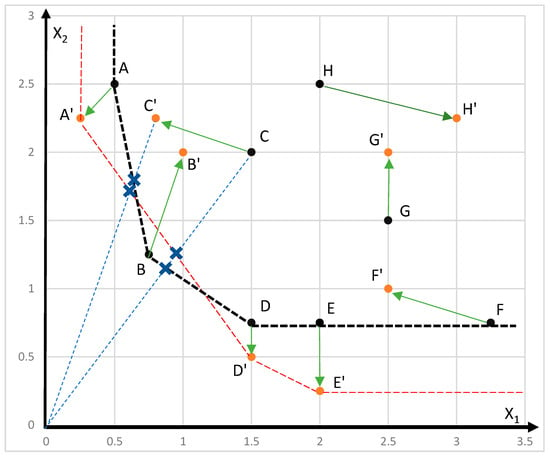
Figure 1
Open AccessArticle
Equilibrium Selection in Hawk–Dove Games
by
Mario Blázquez de Paz and Nikita Koptyug
Games 2024, 15(1), 2; https://doi.org/10.3390/g15010002 - 31 Dec 2023
Abstract
We apply three equilibrium selection techniques to study which equilibrium is selected in a hawk–dove game with a multiplicity of equilibria. By using a uniform-price auction as an illustrative example, we find that when the demand in the auction is low or intermediate,
[...] Read more.
We apply three equilibrium selection techniques to study which equilibrium is selected in a hawk–dove game with a multiplicity of equilibria. By using a uniform-price auction as an illustrative example, we find that when the demand in the auction is low or intermediate, the tracing procedure method of Harsanyi and Selten (1988) and the quantal response method of McKelvey and Palfrey (1998) select the same equilibrium. When the demand is high, the tracing procedure method does not select any equilibrium, but the quantal response method still selects the same equilibrium as when the demand is low or intermediate. The robustness to strategic uncertainty method of Andersson, Argenton and Weibull (2014) selects two of the multiple equilibria irrespective of the demand size. We also analyze the impact of an increase in the minimum bid allowed by the auctioneer in the equilibrium selection.
Full article
(This article belongs to the Special Issue Applications of Game Theory to Industrial Organization)
►▼
Show Figures

Figure 1
Open AccessArticle
Testing Game Theory of Mind Models for Artificial Intelligence
by
Michael S. Harré and Husam El-Tarifi
Games 2024, 15(1), 1; https://doi.org/10.3390/g15010001 - 28 Dec 2023
Abstract
►▼
Show Figures
In this article, we investigate the relative performance of artificial neural networks and structural models of decision theory by training 69 artificial intelligence models on a dataset of 7080 human decisions in extensive form games. The objective is to compare the predictive power
[...] Read more.
In this article, we investigate the relative performance of artificial neural networks and structural models of decision theory by training 69 artificial intelligence models on a dataset of 7080 human decisions in extensive form games. The objective is to compare the predictive power of AIs that use a representation of another agent’s decision-making process in order to improve their own performance during a strategic interaction. We use human game theory data for training and testing. Our findings hold implications for understanding how AIs can use constrained structural representations of other decision makers, a crucial aspect of our ‘Theory of Mind’. We show that key psychological features, such as the Weber–Fechner law for economics, are evident in our tests, that simple linear models are highly robust, and that being able to switch between different representations of another agent is a very effective strategy. Testing different models of AI-ToM paves the way for the development of learnable abstractions for reasoning about the mental states of ‘self’ and ‘other’, thereby providing further insights for fields such as social robotics, virtual assistants, and autonomous vehicles, and fostering more natural interactions between people and machines.
Full article
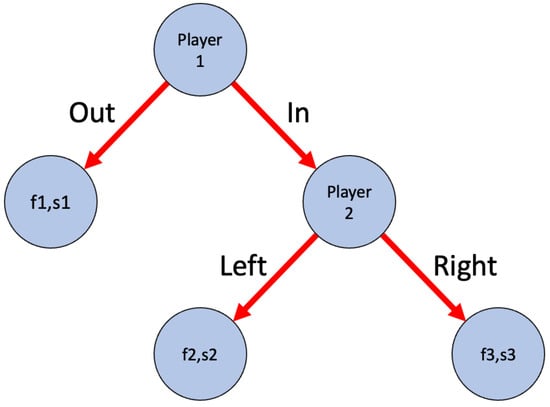
Figure 1
Open AccessArticle
Cooperation and Coordination in Threshold Public Goods Games with Asymmetric Players
by
Xinmiao An, Yali Dong, Xiaomin Wang and Boyu Zhang
Games 2023, 14(6), 76; https://doi.org/10.3390/g14060076 - 17 Dec 2023
Cited by 1
Abstract
In this paper, we study cooperation and coordination in a threshold public goods game with asymmetric players where players have different endowments
In this paper, we study cooperation and coordination in a threshold public goods game with asymmetric players where players have different endowments
(This article belongs to the Special Issue Competition, Coordination, and Cooperation: Theory and Evidence)
►▼
Show Figures
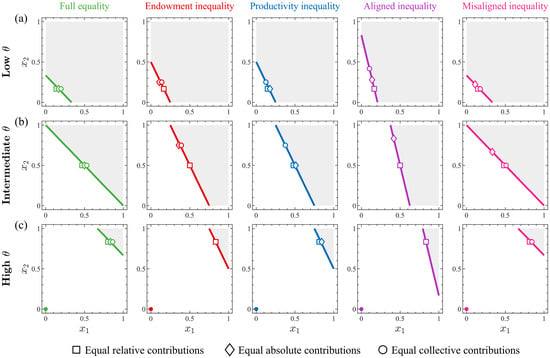
Figure 1
Open AccessArticle
Collaborative Cost Multi-Agent Decision-Making Algorithm with Factored-Value Monte Carlo Tree Search and Max-Plus
by
Nii-Emil Alexander-Reindorf and Paul Cotae
Games 2023, 14(6), 75; https://doi.org/10.3390/g14060075 - 17 Dec 2023
Abstract
►▼
Show Figures
In this paper, we describe the Factored Value MCTS Hybrid Cost-Max-Plus algorithm, a collection of decision-making algorithms (centralized, decentralized, and hybrid) for a multi-agent system in a collaborative setting that considers action costs. Our proposed algorithm is made up of two steps. In
[...] Read more.
In this paper, we describe the Factored Value MCTS Hybrid Cost-Max-Plus algorithm, a collection of decision-making algorithms (centralized, decentralized, and hybrid) for a multi-agent system in a collaborative setting that considers action costs. Our proposed algorithm is made up of two steps. In the first step, each agent searches for the best individual actions with the lowest cost using the Monte Carlo Tree Search (MCTS) algorithm. Each agent’s most promising activities are chosen and presented to the team. The Hybrid Cost Max-Plus method is utilized for joint action selection in the second step. The Hybrid Cost Max-Plus algorithm improves the well-known centralized and distributed Max-Plus algorithm by incorporating the cost of actions in agent interactions. The Max-Plus algorithm employed the Coordination Graph framework, which exploits agent dependencies to decompose the global payoff function as the sum of local terms. In terms of the number of agents and their interactions, the suggested Factored Value MCTS-Hybrid Cost-Max-Plus method is online, anytime, distributed, and scalable. Our contribution competes with state-of-the-art methodologies and algorithms by leveraging the locality of agent interactions for planning and acting utilizing MCTS and Max-Plus algorithms.
Full article
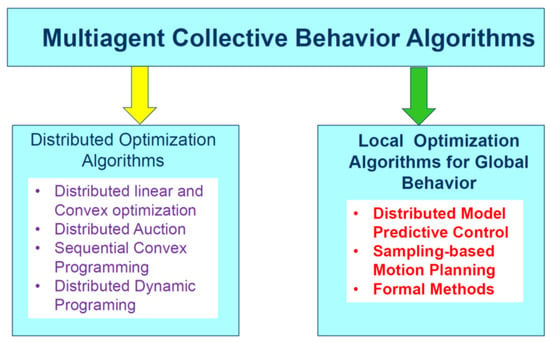
Figure 1
Open AccessArticle
Generalized Hyperbolic Discounting in Security Games of Timing
by
Jonathan Merlevede, Benjamin Johnson, Jens Grossklags and Tom Holvoet
Games 2023, 14(6), 74; https://doi.org/10.3390/g14060074 - 30 Nov 2023
Abstract
In recent years, several high-profile incidents have spurred research into games of timing. A framework emanating from the FlipIt model features two covert agents competing to control a single contested resource. In its basic form, the resource exists forever while generating value at
[...] Read more.
In recent years, several high-profile incidents have spurred research into games of timing. A framework emanating from the FlipIt model features two covert agents competing to control a single contested resource. In its basic form, the resource exists forever while generating value at a constant rate. As this research area evolves, attempts to introduce more economically realistic models have led to the application of various forms of economic discounting to the contested resource. This paper investigates the application of a two-parameter economic discounting method, called generalized hyperbolic discounting, and characterizes the game’s Nash equilibrium conditions. We prove that for agents discounting such that accumulated value generated by the resource diverges, equilibrium conditions are identical to those of non-discounting agents. The methodology presented in this paper generalizes the findings of several other studies and may be of independent interest when applying economic discounting to other models.
Full article
(This article belongs to the Special Issue Game Theory for Cybersecurity and Privacy)
►▼
Show Figures
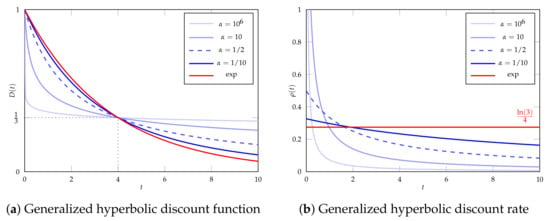
Figure 1
Open AccessArticle
Factors in Learning Dynamics Influencing Relative Strengths of Strategies in Poker Simulation
by
Aaron Foote, Maryam Gooyabadi and Nikhil Addleman
Games 2023, 14(6), 73; https://doi.org/10.3390/g14060073 - 29 Nov 2023
Abstract
Poker is a game of skill, much like chess or go, but distinct as an incomplete information game. Substantial work has been done to understand human play in poker, as well as the optimal strategies in poker. Evolutionary game theory provides another avenue
[...] Read more.
Poker is a game of skill, much like chess or go, but distinct as an incomplete information game. Substantial work has been done to understand human play in poker, as well as the optimal strategies in poker. Evolutionary game theory provides another avenue to study poker by considering overarching strategies, namely rational and random play. In this work, a population of poker playing agents is instantiated to play the preflop portion of Texas Hold’em poker, with learning and strategy revision occurring over the course of the simulation. This paper aims to investigate the influence of learning dynamics on dominant strategies in poker, an area that has yet to be investigated. Our findings show that rational play emerges as the dominant strategy when loss aversion is included in the learning model, not when winning and magnitude of win are of the only considerations. The implications of our findings extend to the modeling of sub-optimal human poker play and the development of optimal poker agents.
Full article
(This article belongs to the Section Applied Game Theory)
►▼
Show Figures

Figure 1
Open AccessArticle
Quantum Tapsilou—A Quantum Game Inspired by the Traditional Greek Coin Tossing Game Tapsilou
by
Kalliopi Kastampolidou and Theodore Andronikos
Games 2023, 14(6), 72; https://doi.org/10.3390/g14060072 - 20 Nov 2023
Abstract
This paper introduces a new quantum game called Quantum Tapsilou that is inspired by the classical traditional Greek coin tossing game tapsilou. The new quantum game, despite its increased complexity and scope, retains the most important characteristic of the traditional game. In the
[...] Read more.
This paper introduces a new quantum game called Quantum Tapsilou that is inspired by the classical traditional Greek coin tossing game tapsilou. The new quantum game, despite its increased complexity and scope, retains the most important characteristic of the traditional game. In the classical game, both players have
(This article belongs to the Special Issue Applications of Game Theory with Mathematical Methods)
►▼
Show Figures

Figure 1
Highly Accessed Articles
Latest Books
E-Mail Alert
News
Topics

Conferences
Special Issues
Special Issue in
Games
Economics of Motivated Beliefs
Guest Editor: Xiaojian ZhaoDeadline: 30 April 2024
Special Issue in
Games
Game Theory for Cybersecurity and Privacy
Guest Editors: Mohammad Mahdi Khalili, Xueru ZhangDeadline: 15 May 2024
Special Issue in
Games
Communication and Persuasion and Their Economic and Political Applications
Guest Editors: Ming Li, Arianna DeganDeadline: 31 May 2024
Special Issue in
Games
In Pursuit of the Unification of Evolutionary Dynamics
Guest Editors: Arnaud Z. Dragicevic, Ştefan Cristian GherghinaDeadline: 30 June 2024



